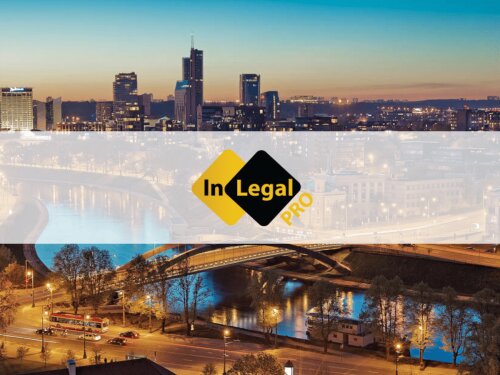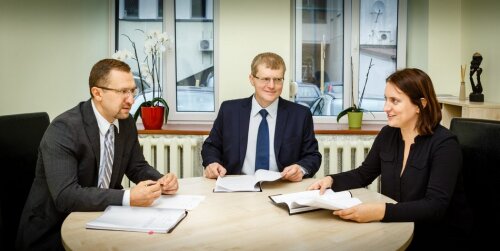Best Citizenship Lawyers in Republic of Lithuania
Share your needs with us, get contacted by law firms.
Free. Takes 2 min.
Or refine your search by selecting a city:
List of the best lawyers in Republic of Lithuania
About Citizenship Law in Republic of Lithuania:
Citizenship in the Republic of Lithuania is regulated by the Law on Citizenship of the Republic of Lithuania. It defines who is considered a citizen of Lithuania, outlines the process of acquiring or losing citizenship, and sets the criteria for dual citizenship. Becoming a citizen of Lithuania typically requires meeting residency requirements, passing a language exam, and demonstrating ties to the country.
Why You May Need a Lawyer:
People may need a lawyer for citizenship in Lithuania in situations such as applying for citizenship, resolving citizenship disputes, challenging citizenship decisions, or navigating complex legal requirements. A lawyer can provide guidance, assistance with paperwork, representation in legal proceedings, and help ensure that your rights are protected.
Local Laws Overview:
In Lithuania, citizenship is primarily based on the principles of jus sanguinis (right of blood) and requires a person to have Lithuanian ancestors or connections to Lithuania. The law also allows for dual citizenship in certain circumstances, such as marriage to a Lithuanian citizen or birthright. It is important to follow the legal procedures carefully to acquire citizenship and avoid any pitfalls.
Frequently Asked Questions:
Q: How can I become a citizen of Lithuania?
A: To become a citizen of Lithuania, you typically need to have Lithuanian ancestry, meet residency requirements, pass a Lithuanian language exam, and show ties to the country.
Q: Can I have dual citizenship in Lithuania?
A: Dual citizenship in Lithuania is allowed in limited circumstances, such as marriage to a Lithuanian citizen or by birthright. You will need to meet specific criteria to qualify for dual citizenship.
Q: What are the residency requirements for Lithuanian citizenship?
A: The residency requirements for Lithuanian citizenship vary depending on the circumstances. Typically, you need to have lived in Lithuania for a certain period of time and have ties to the country.
Q: Can I challenge a decision on my citizenship application?
A: If your citizenship application is denied or you face other citizenship-related issues, you may be able to challenge the decision through legal means. A lawyer can help you navigate this process.
Q: What rights do Lithuanian citizens have?
A: Lithuanian citizens have the right to vote, work, reside, and receive social benefits in Lithuania. They also have the right to travel freely within the European Union.
Q: Can I lose my Lithuanian citizenship?
A: You can lose your Lithuanian citizenship by renouncing it voluntarily, acquiring citizenship in another country that does not allow dual citizenship, or committing certain acts prohibited by law.
Q: How long does it take to become a citizen of Lithuania?
A: The process of becoming a citizen of Lithuania can vary depending on individual circumstances and the complexity of your case. It may take several months to years to complete the necessary steps.
Q: Do I need to speak Lithuanian to become a citizen?
A: To become a citizen of Lithuania, you typically need to pass a Lithuanian language exam or demonstrate proficiency in the language. Some exceptions may apply for individuals with specific circumstances.
Q: Can I apply for Lithuanian citizenship if I was born in Lithuania?
A: If you were born in Lithuania but do not automatically qualify for citizenship, you may be able to apply for citizenship through other means, such as residency or descent from Lithuanian ancestors.
Q: How can a lawyer help me with my Lithuanian citizenship issues?
A: A lawyer can assist you in navigating the complex legal requirements for acquiring citizenship, challenging citizenship decisions, and ensuring that your rights are protected throughout the process. They can provide guidance, representation, and expertise in citizenship matters.
Additional Resources:
For additional information on Lithuanian citizenship laws and procedures, you can consult the Lithuanian Ministry of Interior or contact a legal organization specializing in citizenship issues. These resources can provide valuable guidance and assistance in citizenship matters.
Next Steps:
If you require legal assistance in citizenship matters in Lithuania, it is recommended to contact a qualified lawyer with experience in Lithuanian citizenship law. They can provide personalized advice, representation, and support to help you navigate the complexities of acquiring or resolving citizenship issues in Lithuania.
Lawzana helps you find the best lawyers and law firms in Republic of Lithuania through a curated and pre-screened list of qualified legal professionals. Our platform offers rankings and detailed profiles of attorneys and law firms, allowing you to compare based on practice areas, including Citizenship, experience, and client feedback.
Each profile includes a description of the firm's areas of practice, client reviews, team members and partners, year of establishment, spoken languages, office locations, contact information, social media presence, and any published articles or resources. Most firms on our platform speak English and are experienced in both local and international legal matters.
Get a quote from top-rated law firms in Republic of Lithuania — quickly, securely, and without unnecessary hassle.
Disclaimer:
The information provided on this page is for general informational purposes only and does not constitute legal advice. While we strive to ensure the accuracy and relevance of the content, legal information may change over time, and interpretations of the law can vary. You should always consult with a qualified legal professional for advice specific to your situation.
We disclaim all liability for actions taken or not taken based on the content of this page. If you believe any information is incorrect or outdated, please contact us, and we will review and update it where appropriate.
Browse citizenship law firms by city in Republic of Lithuania
Refine your search by selecting a city.












